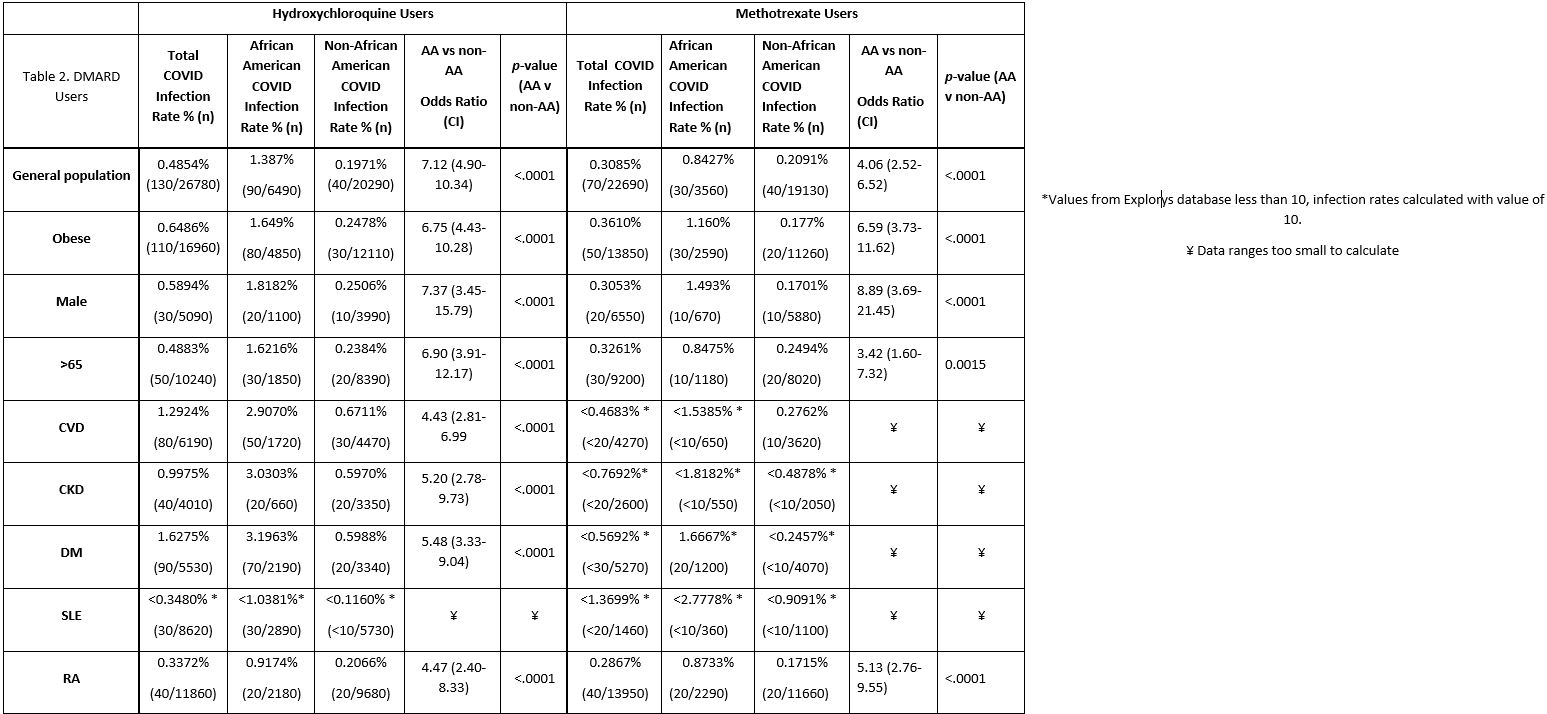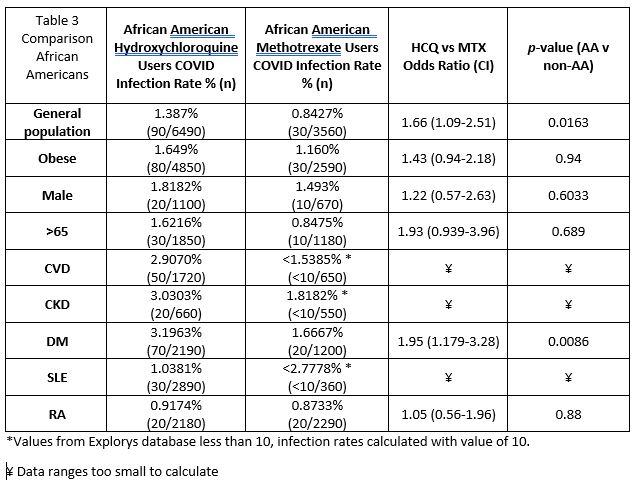Session Information
Session Type: Abstract Session
Session Time: 4:00PM-4:50PM
Background/Purpose: In the initial months of the SARS CoV2/COVID19 pandemic, broad use of off-label therapy with hydroxychloroquine (HCQ) was prescribed to reduce CoV2-related morbidity and mortality. Disparity in infection rates in non-Caucasians were observed even when other co-morbidities such as diabetes, obesity and smoking were accounted for. We hypothesized that if HCQ was effective against CoV2, then the rates of CoV2 infections in patients treated with HCQ for both African Americans and non-African Americans, would be lower than in those using patients methotrexate (MTX) as a control drug that was not postulated, at the time, to protect against CoV2.
Methods: A retrospective observational analysis utilizing IBM Watson Health Explorys data was performed. The Explorys database contains pooled de-identified clinical data. Explorys aggregates, standardizes and normalized clinical data from diverse electronic health records. Patient records are mapped into a systematized nomenclature of medicine- clinical terms (SNOMED-CT) hierarchy. To determine if chronic use of HCQ prevented CoV2 infection, individuals prescribed HCQ or MTX at least twice in the preceding 12 months were included. Incident disease was identified using the term SNOMED-CT diagnosis of “Disease caused by Coronoviridae” (CorV) to calculate infection rates. Cohorts were analyzed accordingly: African American (AA) or not AA, male sex, age >65, presence of obesity, cardiovascular disease (CVD), chronic kidney disease (CKD), and diabetes (DM). Rates of infection were calculated and compared to the reference populations using odds ratios (OR).
Results: At time of data collection in May 2020, Explorys included data from 68,569,460 patients. There were 14,490 total infections of CoV; Infection rates for the general population are shown in table 1, 34% were in AA patients. Table 2 shows infection rates in patients who used either HCQ or MTX . Table 3 shows a comparison of rates of infection in AA in those treated with HCQ or MTX. AA were more likely to be diagnosed with a CorV than nonAA overall in all the analyses: the odds ratio (OR) of having a corona virus ranged from 3.31-5.27 (all statistically significant). In both HCQ and MTX users, AA were more likely to be diagnosed with a CorV infection as compared with nonAA ranging from 4.43 to 7.37 in HCQ users and, 3.42-8.89 in MTX users. Comparing AA, there was a trend towards HCQ users being more likely than MTX users to be diagnosed with a CorV infection, but none of these comparisons were statistically significant. Death rates in each cohort were also calculated but too low to report (0 or < 10 each).
Conclusion: Of total CoV infections through May 2020, a higher proportion of those with a diagnosis of CorV were AA. When variables were analyzed separately, the ORs were elevated in AA with the following comorbidities: male sex, age >65, presence of obesity, CVD, CKD, DM. AA lupus and rheumatoid arthritis (RA) patients were more likely to be diagnosed with an infection compared to non-AA with lupus/RA. The data suggest that the disparities are exaggerated in rheumatology patients who contract CoV and that infection rates are not reduced in either in AA or non-AA on chronic HCQ. In contrast, rates of diagnosis of CoV were lower for patients on MTX.
 General population: CoV infection rate comparing African Americans and non-African Americans
General population: CoV infection rate comparing African Americans and non-African Americans
 Comparing CoV infection rates in African Americans to non-African Americans; left panel hydroxychloroquine users; right panel methotrexate users
Comparing CoV infection rates in African Americans to non-African Americans; left panel hydroxychloroquine users; right panel methotrexate users
 CoV infection rates in African American hydroxychloroquine users compared to methotrexate users
CoV infection rates in African American hydroxychloroquine users compared to methotrexate users
To cite this abstract in AMA style:
Antonelli M, Singer N. Disparities in CoronaViridae Infection Are Readily Apparent in Rheumatology Patients Despite Use of Hydroxychloquine And/or Methotrexate [abstract]. Arthritis Rheumatol. 2020; 72 (suppl 10). https://acrabstracts.org/abstract/disparities-in-coronaviridae-infection-are-readily-apparent-in-rheumatology-patients-despite-use-of-hydroxychloquine-and-or-methotrexate/. Accessed .« Back to ACR Convergence 2020
ACR Meeting Abstracts - https://acrabstracts.org/abstract/disparities-in-coronaviridae-infection-are-readily-apparent-in-rheumatology-patients-despite-use-of-hydroxychloquine-and-or-methotrexate/
